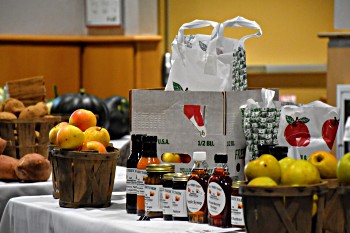
PRINCESS ANNE, MD- (February 25, 2020)-Helping Maryland’s small farmers growing fresh produce and raising animals with primarily local marketing channels keep food safe is the focus of a half million dollar research and extension project newly funded by the USDA National Institute of Food and Agriculture Organic Transition Program.
Researchers at the University of Maryland Eastern Shore, University of Maryland College Park and USDA Agricultural Research Service will collaborate on the investigation of “sources and control of Salmonella and shigatoxin producing E. coli in Integrated Crop-Livestock Farms.”
“We hypothesize that organic and conventional ICLFs (farms that have both crops and animals) might have more contamination in samples compared to their crop-only counterparts,” said Dr. Salina Parveen, professor of food science and technology at UMES and one of the project’s investigators. “Since farmer’s markets are a common retail venue for locally grown produce including that of ICLFs, they might get a higher percentage of microbial contaminants from produce available there.”
Drs. Fawzy Hashem, a professor in the Department of Agriculture, Food and Resource Sciences, and E. Nelson Escobar, small ruminant specialist and interim associate administrator for Extension, round out UMES’ team. Out of the half million dollar grant, UMES will receive $150,000 for its part in the project. Drs. Debu Biswas and Robert Buchanan of UMCP and Pat Millner of USDA ARS are the other investigators in the grant titled, “The Ecology, Transmission and Control of Salmonella and Shigatoxin Producing E. coli in Integrated Crop-Livestock (ICLF) Farms.”
“Results from risk profiling and risk assessment studies will provide critical information regarding exposure risk to these pathogens through consumption of produce from ICLFs and crop-only farms (organic and conventional) and potential interventions to control these pathogens,” Parveen said. The information will help industry, policy makers, extension educators, small farmers and consumers to better understand foodborne human infections with these pathogens, she said, and aid in implementing mitigation strategies to control public health risks.
“For extension educators, the implementation of this project plays an essential step for the extension educational task,” Escobar said. “Evidence-based training will promote effective interventions to enhance food security and survival of small family farms.”
Gail Stephens, agricultural communications and media associate, School of Agricultural & Natural Sciences, 410-621-3850, gcstephens@umes.edu.
UMES Extension programs are open to all citizens without regard to race, color, gender, disability, religion, age, sexual orientation, martial or parental status, or national origin.

